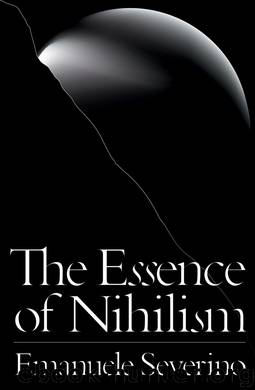The Essence of Nihilism by Emanuele Severino Alessandro Carrera Ines Testoni

Author:Emanuele Severino,Alessandro Carrera,Ines Testoni
Language: eng
Format: epub
Publisher: Penguin Random House LLC (Publisher Services)
25. METAPHYSICS AND MODERN SCIENCE
The divorce of modern science from traditional metaphysics is the precursor of the controversy concerning technology. Galileo came to deny the ingenerability and incorruptibility of the celestial bodies. Yet this radical rejection of Aristotle’s physics left the Aristotelian meaning of generation and corruption intact. Galileo maintained that the celestial bodies too are generated and corrupted, but for him (as for all of modern physics and science after him) generation and corruption retain the very same meaning given them by Aristotle.
Today, the myriad differences between the Aristotelian categories and those of modern science are self-evident. And yet this masks a fundamental blindness which can neither know nor discern the common ground on which both Aristotle’s discourse and that of modern science grow.
This blindness contrasts the Darwinian concept of the “origin of the species” with Aristotle’s notion of the species as immutable and inoriginate. The “origin of the species” intended to revolutionize the Aristotelian conception of nature, bringing about a transformation in zoology and botany analogous to the one that had taken place in astronomy and the other sciences. Galileo affirmed the generability and corruptibility of the celestial bodies, Darwin the generability and corruptibility of the species. But the revolution was only superficial, since in the very concept of an origin of the species the fundamental thought of metaphysics, and thus also of Aristotelian metaphysics, is held fast: “origin” means a process of generation as absolute innovation and thus as an arising into positivity by emerging from nothingness. The “origin of the species” is but one of the ways in which metaphysical nihilism lives in modern science. The fact that for Aristotle the species or the celestial bodies could not be modified, whereas for modern science they can be, or that the transformations considered by Aristotelian physics were only qualitative, while for modern physics they are quantitative, or that modern physics can rely on a methodic instrument capable of controlling the production of things, while in poiesis such production was almost exclusively entrusted to craftsmanship—all these things and many others are, unquestionably, important differences in Western history. And yet, these very differences constitute the moments of the history of nihilism. They are moments of the fundamental—and the only—way of thinking and living in the West.
Download
This site does not store any files on its server. We only index and link to content provided by other sites. Please contact the content providers to delete copyright contents if any and email us, we'll remove relevant links or contents immediately.
| Anarchism | Communism & Socialism |
| Conservatism & Liberalism | Democracy |
| Fascism | Libertarianism |
| Nationalism | Radicalism |
| Utopian |
The Secret History by Donna Tartt(19048)
The Social Justice Warrior Handbook by Lisa De Pasquale(12187)
Thirteen Reasons Why by Jay Asher(8893)
This Is How You Lose Her by Junot Diaz(6877)
Weapons of Math Destruction by Cathy O'Neil(6264)
Zero to One by Peter Thiel(5786)
Beartown by Fredrik Backman(5737)
The Myth of the Strong Leader by Archie Brown(5498)
The Fire Next Time by James Baldwin(5431)
How Democracies Die by Steven Levitsky & Daniel Ziblatt(5213)
Promise Me, Dad by Joe Biden(5141)
Stone's Rules by Roger Stone(5081)
A Higher Loyalty: Truth, Lies, and Leadership by James Comey(4951)
100 Deadly Skills by Clint Emerson(4920)
Rise and Kill First by Ronen Bergman(4779)
Secrecy World by Jake Bernstein(4740)
The David Icke Guide to the Global Conspiracy (and how to end it) by David Icke(4701)
The Farm by Tom Rob Smith(4502)
The Doomsday Machine by Daniel Ellsberg(4484)
